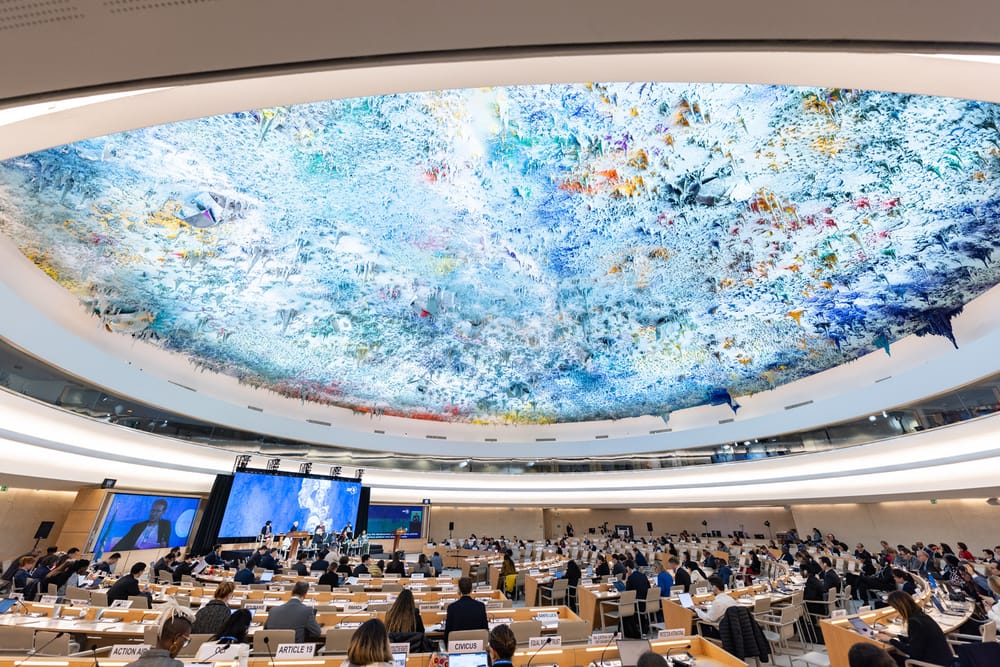By David Harland
Diplomacy as tool of first resort
The victors of World War II decided that diplomacy would be the main way to maintain international peace and security: disputes would be settled by peaceful means, and there would be no use or threat of force against the territorial integrity or political independence of any state.
And, to a remarkable degree, it worked. Inter-state warfare, so prevalent in previous ages, almost disappeared.
Diplomats found ways to mitigate the risk of a nuclear war. They found workable compromises with respect to the status of Finland and then Austria, which could have triggered a war among the victors of World War II. Then, piece by piece, they put in place the architecture of nuclear non-proliferation and arms control. The Nuclear Non-Proliferation Treaty (NPT) limited the spread of nuclear weapons, and the arrangements that began with the Strategic Arms Limitations Talks (SALT I) created the rough balance and predictability that was needed to restrain the actions of states with nuclear weapons.
Effective diplomacy was not simply limited to the US and the Soviet Union, or to the management of global risks. The UN Charter turned out to be a good framework for the management of decolonisation from the 1940s to the 1960s, which saw billions of people becoming citizens of independent states. And, in the late 1980s and 1990s, the UN Security Council, supported by mediators, election monitors and peacekeeping troops on the ground, was able to help most of them regain some semblance of stability: Cambodia, El Salvador, Guatemala, Nicaragua, Liberia, Sierra Leone and many more.
None of this was easy, and often very frustrating. And yet, there was a sense that diplomacy was a serious tool that could help to manage the biggest threats to human survival. Diplomacy was a tool of first resort. And then, a little over a decade ago, diplomacy stopped being this tool.
Diplomacy in decline
Since around 2010, the Security Council has hardly agreed on anything noteworthy. The Council helped unleash the chaos in Libya in 2011, but was then unable to do much to help pick up the pieces. From Syria to Yemen, the Council has been blocked and, when it has spoken, its resolutions have been so detached from reality that they have created new impediments to peace. As for the latest threats to international peace and security – the Russian invasion of Ukraine and the looming risk of a conflict between China and the US over Taiwan – the Council has nothing to say.
There are structural reasons for this, including the relative decline of US power and the growing challenges posed by its antagonists. Putin’s address to the Munich Security Conference in 2007 is seen as a turning point, putting the West on notice that the ‘end of history’ was over.
There is a view that the recent absence of diplomatic solutions to global security problems does not matter as much. From this viewpoint, diplomacy has had its day, like hand-writing or driving horse-drawn coaches. It was a form of inter-governmental relations adapted to a particular type of international system. Since that system has changed, so has the mode of interaction within that system.
For example, the rise of huge global corporations has naturally led to modes of interaction that are not easily contained within the framework of intergovernmental diplomacy. A case in point is Elon Musk’s decision about the use of Starlink in Ukraine.
This view is wrong.
Not only are there no new tangible diplomatic propositions to this growing list of challenges, but diplomats are actively dismantling the instruments that earlier generations put in place.
The list of global problems that require real solutions – including threats to human existence – is growing. The risk of nuclear war is back as nuclear powers are either expanding or modernising their arsenals and improving their delivery systems. Additional risk factors include climate change, pandemics, and perhaps advanced AI.
Not only are there no new tangible diplomatic propositions to this growing list of challenges, but diplomats are actively dismantling the instruments that earlier generations put in place. Many of the important arms control instruments – the Intermediate-Range Nuclear Forces (INF) Treaty, New Start, and Open Skies – have been abandoned or now exist only on paper. The Treaty on Conventional Forces in Europe (CFE) is the latest domino to fall. The Organisation for Security and Co-operation in Europe (OSCE), which was meant to provide an institutional framework for diplomacy to manage security risks in Europe and beyond, is almost dead.
This decline of diplomacy is particularly noticeable among Western countries. Increasingly, Western diplomacy involves simply not speaking to people you do not like – a sort of ‘intergovernmental cancel culture’. This may be viable with the likes of Syria, the Taliban, or North Korea, but makes it almost impossible to deal effectively with Moscow or Beijing.
Moreover, Western diplomacy, unlike the diplomacy of any other part of the world, is largely animated by the view that the rest of the world should be more like the West. For close to 200 years, this mission civilisatrice seemed viable, even though the values themselves were shifting, thanks to the relative power balance that undergirded it. Now, when the West insists that other countries follow its democratic norms, or its understanding of human rights, those countries often resist and can make their own choices. The fact that Iran and Saudi Arabia were able to make an agreement under Chinese auspices is a measure of the extent to which Western diplomacy is no longer wanted in much of the world. The emergence of ‘the West versus the rest’ as one of the basic frameworks for international relations is an indictment of the state of Western diplomacy.
However, the rot that is undermining diplomacy is not limited to the West. Many of the powerful non-Western countries exhibit similar pathologies. China, for instance, often practices diplomacy that seems to be contrary to its own interests. As a rising power, China’s principal diplomatic imperative is presumably to create conditions conducive to its further rise and to forestall the emergence of a coalition of countries that might impede such a rise.
Yet, China’s ‘Wolf Warrior’ diplomacy sometimes appears to be deliberately designed to frighten and antagonise large swaths of the world: India, with which it has a long and unsettled border; Australia for supporting an inquiry into COVID’s origins; Canada for its part in a US-China spat; Philippines and Vietnam for pushing back against China’s huge claims in the South China Sea; Japan and South Korea for different reasons.
The identification and careful pursuit of common goals is not the point of the diplomatic exercise.
Reversing the decline
While there is no silver bullet, we can start to rebuild governmental diplomacy and work on alternatives.
What can be done as the risks grow and the tools for managing those risks are weakened? While there is no silver bullet, we can start to rebuild governmental diplomacy and work on alternatives.
Governments have to be reminded that there exists a hierarchy of interests, with national survival at the top. Related priorities such as managing nuclear weapons, preventing AI from running amok, mitigating climate change, and preventing future pandemics are directly linked to survival and therefore trump other laudable goals including the extension of Western values to non-Western countries. Western governments, in particular, have to face the fact that they can no longer have it all. Space for reasoned, confidential discussions about the most important issues needs to be rebuilt.
We live in an age of shifting constellations: countries that cooperate on one issue may compete on another and be in an active conflict on the third.
Although we live in an age of intense polarisation, effective diplomacy cannot just be about insisting on one’s own position and loudly denouncing one’s interlocutors. To be successful, diplomacy has to be tailored to the global context and involve compromise. We live in an age of shifting constellations: countries that cooperate on one issue may compete on another and be in an active conflict on the third. China and the US need each other on climate; they compete in their struggle to control access to microchips, and they may fight over Taiwan. This is not ‘good’ or ‘bad’, it is merely reflective of the way the world works at the moment. Diplomacy needs to be able to deal with this complexity, even if it may be rhetorically and politically unsatisfying.
Finally, there must be alternatives. Formal diplomacy may not have been able to prevent the war in Ukraine, but there have been diplomatic successes, like the Russia-Ukraine Grain Deal that helped regulate food prices for hundreds of millions of people across the Global South. What this success has in common with others, such as the talks that ended the war in Tigray, is that it was a hybrid effort. These involved private diplomacy actors, such as Geneva’s Centre for Humanitarian Dialogue, which initiated both the grain deal and the Tigray process, along with formal multilateral bodies acting with quiet support from individual governments. Other private actors, such as the London-based Inter Mediate and the Community of Sant’Egidio in Rome have also been able to play useful roles in helping end wars. One answer to hybrid war, in other words, is hybrid diplomacy.
Charles-Maurice de Talleyrand – the renowned 19th-century French diplomat – may have been right that diplomacy shouldn’t involve trop de zèle (too much zeal). However, enough zèle to at least be able to set priorities, and to pursue those priorities without antagonising the other parties, would be a good start to reverse the decline of diplomacy.
About the author
David Harland is the Executive Director of the Geneva Centre for Humanitarian Dialogue and serves on the UN Secretary-General’s high-level advisory board on mediation.
The opinions expressed in this publication are those of the authors. They do not purport to reflect the opinions or views of the Geneva Policy Outlook or its partner organisations.





